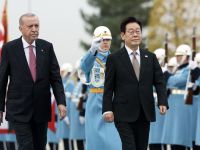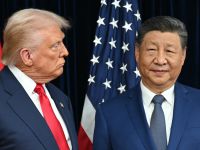Meeting under a virtual security lockdown, and with a terrorism-driven recession looming over the world economy, WTO ministers are Friday to mount a fresh effort to tear down barriers to global trade.
Delegates from the 142-member World Trade Organization will gather in a luxury hotel in the Qatari capital to start a five-day conference aimed at easing the flow of goods and services across national borders.
Qatari authorities on Thursday beefed up security a day after a lone gunman was shot dead in an exchange of fire at a US airbase south of Doha.
As terrorism fears persisted, the United States diverted an amphibious assault ship with a contingent of Marines -- trained in evacuating civilians -- from the Arabian Sea toward Qatar as a precautionary move, a Pentagon official disclosed in Washington.
The vessel had been deployed in the region to support the US military campaign in Afghanistan, accused by Washington of harboring militants who masterminded deadly suicide attacks in the United States on September 11.
The US operation raised tension in the area and nearly lost Qatar -- like Afghanistan a Moslem state -- its chance to host the conference, as many WTO members voiced fears about holding their meeting here.
In a show of strength, heavily armed Qatari troops in blue camouflage fatigues, flak jackets and steel helmets were standing guard Thursday under hastily erected sunshades in searing heat at every traffic intersection and along main roads.
Behind them were off-road vehicles mounted with heavy machine guns.
"Today, it's nothing. Wait until tomorrow," one policeman said.
With the US, German and Japanese economies plunging toward recession in the wake of the September 11 attacks, the stakes in Doha are vastly higher than they were two years ago when the WTO met in Seattle.
There, internal disputes and the presence of some 40,000 anti-globalization protesters combined to thwart an effort by the WTO to agree on a new round for multilateral talks aimed at removing obstacles to world trade.
While massive street protests are unlikely in Qatar, a conservative Islamic state, the Doha conference nonetheless appears plagued by the same deep policy differences that derailed the Seattle meeting.
The United States remains at odds with the European Union over agricultural export subsidies, the European Union has sparked resistance from developing countries with its insistence on labor rights and environmental safeguards, and poor nations are again clamoring for greater access to markets in the industrialized world.
In addition, WTO Director General Mike Moore has bluntly warned that unless rich and poor countries overcome differences on an emotional public health issue -- the availability of cheap, generic drugs to fight AIDS -- the meeting could fail.
But a US trade official, speaking on background late Thursday, said an agreement here on a new trade liberalization round was indeed possible.
"It is certainly doable," he told reporters.
"We have some difficult negotiations before us, but if you look at the attitude of the countries coming here we think that countries are interested in finding the right formula for launching these negotiations.
"People do not want to be part of a second failure."
Moore acknowledged Thursday that delegations were unsatisfied with many aspects of a draft declaration that is to be debated in Doha.
"There is a balance of unhappiness here -- those who feel we have gone too far, those who feel we have not gone far enough," he conceded -- AFP
© 2001 Al Bawaba (www.albawaba.com)







